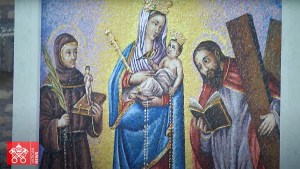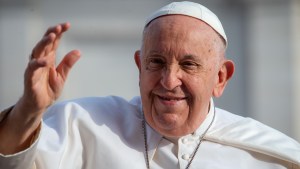Nuestra Señora del Rosario de Chiquinquirá is a venerated Marian devotion in Catholicism, recognized as the Queen and Patroness of Colombia. Named after Chiquinquirá county (where her first miraculous manifestation occurred), this holy image is honored with processions and special liturgical celebrations on July 9 in Colombia.
Notable visits to her basilica include Pope John Paul II in 1986 and Pope Francis in 2017. In Venezuela, her image at the Basilica of Our Lady of Chiquinquirá in Maracaibo attracts thousands of pilgrims, especially on her other feast day, November 18.
The Colombian miracle
The original painting of the Virgin of Chiquinquirá was made in 1562, by Alonso de Narváez. Born in the province of Seville, Spain, Narváez spent much of his life in colonial Colombia, where he created the image on a piece of cotton cloth woven by indigenous Colombians. Using mineral pigments, he depicted the Virgin of the Rosary with the Christ Child in her arms, flanked by St. Anthony of Padua and St. Andrew the Apostle. Over time, the painting deteriorated due to exposure to the elements and was eventually abandoned.
A miraculous restoration of the painting took place on December 26, 1586. María Ramos, a pious woman, had placed the faded image in a renovated chapel. Tradition says that one day, the image began to regain its color and clarity, and the scratches and holes in the canvas sealed themselves. This miraculous restoration was seen as a divine sign that revived the faith of the local community.

The Virgin of Chiquinquirá is now kept in the Basilica of Our Lady of the Rosary in Chiquinquirá, Colombia. Despite its fragile nature, the painting has survived centuries of devotion and environmental challenges. It has been protected since 1897 by a thick glass cover. Pope Pius X authorized the canonical coronation of the Virgin of Chiquinquiráin 1910, and in 1986, Pope John Paul II visited the shrine and prayed for peace in Colombia.
The Venezuelan miracle
In Venezuela, the story of Our Lady of Chiquinquirá is equally miraculous. In November 1709, a woman washing clothes at Lake Maracaibo discovered a small wooden tablet floating in the water. She took it home to use it for domestic tasks, but the next morning, the image of Our Lady of Chiquinquirá miraculously appeared on it. Amazed, she ran out and cried, “¡Milagro! ¡Milagro!” (Miracle! Miracle!), marking the event as a matter of divine intervention.
The tablet soon became an object of love and veneration. The people of Maracaibo saw it as a sign from God, and their devotion to La Chinita (as locals lovingly refer to her) flourished. The image remains in the Basilica of Maracaibo.
The Feast of La Chinita, which begins on November 18, celebrates this miracle with Masses, processions and traditional gaita music, marking the beginning of the Christmas season in Venezuela.
The small wooden panel, measuring 26 by 25 centimeters, also depicts the Virgin Mary with the baby Jesus, St. Andrew and St. Anthony.
Over the years, it has been preserved and embellished with 18-karat gold, adding to its beauty and significance.

A shared heritage
The stories of Our Lady of Chiquinquirá from these two neighboring countries speak of a shared legacy of faith. Each miracle, rooted in humble beginnings, has grown into a revered symbol of divine love, inspiring hope in millions.
As the patroness of Colombia, and of the Venezuelan state of Zulia, Our Lady of the Rosary of Chiquinquirá continues to inspire and unite Catholics throughout the region, drawing them closer to their faith and to one another.



